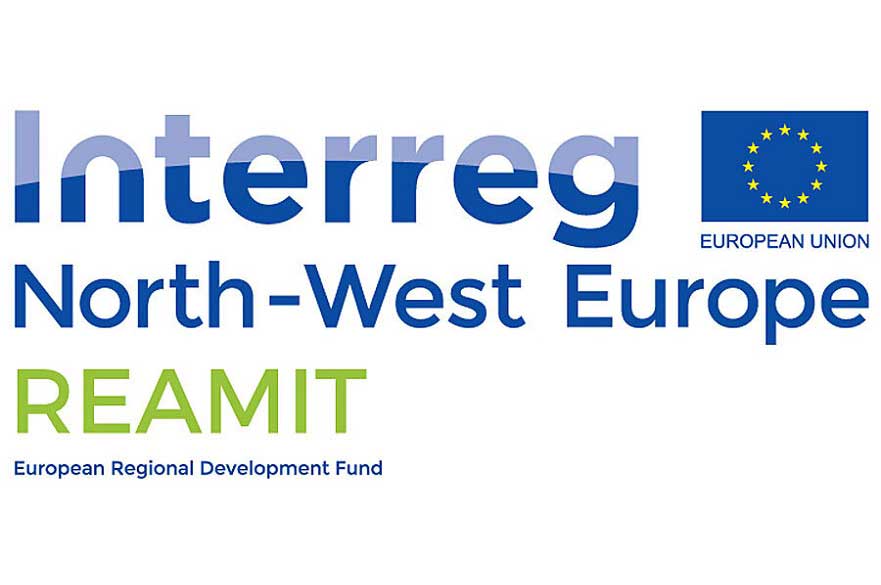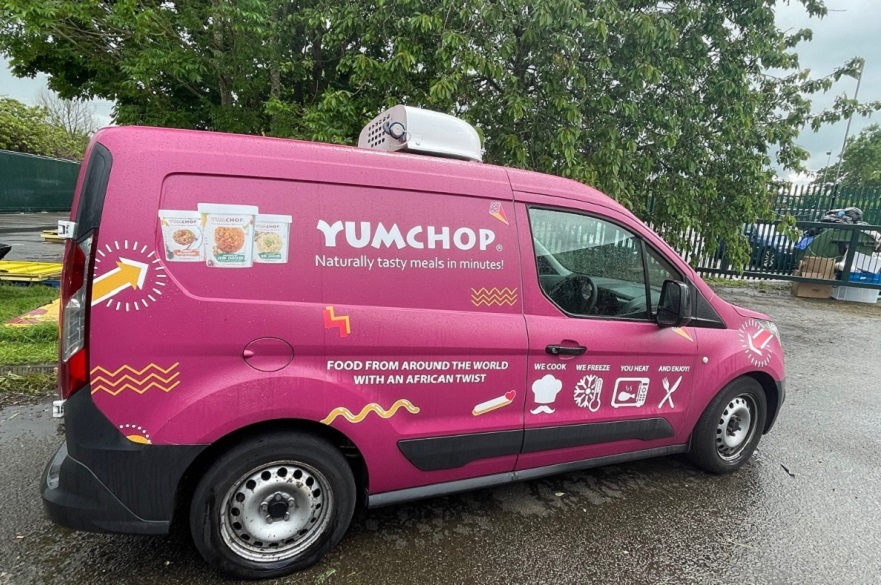Pilot study shows how zero waste in food supply chain could be achieved through smart IoT technology
Initial results from pilot studies have shown how food waste in the supply chain could be significantly reduced through the use of smart technology including Internet of Things (IoT).
The REAMIT project (Improving Resource Efficiency of Agribusiness supply chains by Minimizing waste using big data and IoT sensors) aims to save 1.8Mt of food waste or €3B per year in North-West Europe and prevent 5.5Mt/yr of CO2 emissions. It involves a consortium of food and technology organisations and universities, including Nottingham Trent University (NTU).
The project is led by Professor Ramakrishnan Ramanathan, University of Essex, UK, with the University of Bedfordshire as the lead partner. The project is funded by Interreg North-West Europe.
It has so far worked with a range of businesses in the UK and North-West Europe to adapt IoT and Big Data technologies to best fit the needs of the food supply chain management system. The supply chain includes farms, packaging sites, food processors, distribution, logistics, wholesalers, and retailers.
By using technology to continuously monitor and record food quality in real time, the REAMIT pilot companies are aiming to achieve zero food waste and assure product quality.

One such organisation involved in the REAMIT pilot test is the Human Milk Foundation (HMF), a charity organisation which delivers donor breast milk to babies in need – often in life-saving circumstances. Its cold chain supply transports milk between houses, hospitals, and its storage hubs. The charity must adhere to strict guidelines from the National Institute for Health and Care Excellence (NICE) to ensure the quality and safety of the human milk.
Through REAMIT technology partners, sensors were placed in the insulated transport boxes - the temperature and humidity of the milk were collected every 30 minutes, while the GPS locator sent data every two minutes. Alerts were sent if the milk temperature rose above a specified threshold. This has allowed the charity to minimise potential wastage of an already limited stock and reduce carbon emissions by saving energy through the optimisation of cooling during transportation. This is the first-time data has been collected on the transportation of donor human milk and is helping the charity to plan the location of future hubs.
Dr Natalie Shenker from the HMF said: “The REAMIT team have provided everything from proof of concept to the innovative sensors that we’re using, that not only track temperature but are able to track humidity, acceleration, they can tell when the boxes will be actively moving—so we can really understand where the milk is, what conditions the milk is transported in and when it’s arrived.”

Yumchop Foods in Northamptonshire create authentic African meals that are free from any added preservatives, colouring or flavourings with responsibly sourced fresh ingredients, natural spices, and herbs. The business model is based on its frozen meals being transported and stored in public vending machines where hot food is delivered to customers using built-in microwave ovens.
Sensors have been placed in the freezers in the production facility of Yumchop Foods to ensure that the required legal temperature thresholds are adhered to, as well as preserving the high quality of the food in preparation for transport. The organisation has benefited from alerts which notify them of any temperature increase and allow staff to investigate and take immediate action – preventing any food waste and subsequent loss of revenue.
Following the initial success, Abi Adefisan, co-founder of Yumchop Foods, hopes to expand their use of the sensors, she said: “It would be great to have the sensors in the vending kiosks to continue to monitor the quality of the products. We want to save our staff from manually going to the sites and taking the records, instead we could get the data in real time like we now do at the production facility.”
Musgrave, Northern Ireland’s leading food retail, wholesale, and foodservice company, was looking to reduce the volume of food waste, increase product shelf life and reduce the cost of losses.
Working with REAMIT partner Ulster University, sensors were placed in its vans used for local deliveries where integrity is lost through doors opening and closing frequently. The sensors have allowed the company to monitor live temperatures in the vehicles and respond quickly to text alerts if sustained temperature abuse is recorded.
Robert Gallagher, Warehouse and Transport Operations Manager at Musgrave, said: “We have monthly sessions with our food service customers where we ask them for feedback on quality and part of that is shelf life. This is where the integrity of the chill chain comes as we do have customers who come in with food they couldn’t use before its use by date. Through this project I’m hoping to see the full life span of our products being utilised.”

Usha Ramanathan, REAMIT communications lead and Professor of Sustainability and Supply Chains at Nottingham Business School, part of NTU, said: “The EU has committed to halving food waste by 2030 by focusing on all stages in the supply chain. Though technologies exist to reduce food waste, they have not been applied to food supply chains.”
“The pilot REAMIT projects have shown a range of prominent benefits to using IoT devices and alert systems – not just for food waste reduction but for quality assurance and food standards regulations, improved food availability, reduced cost, and improved sustainability.”
The trial has led to a variety of policy recommendations for food producers, manufacturers, distributors, and retailers regarding the use of IoT devices and alert systems.
These include introducing data analytics and algorithm-based alerts for ordering stock on demand rather than estimation; using stock inventory collected via IoT devices/smart sensors and analysed with Big Data techniques for enhanced planning and identification of emerging trends and improved reactions to stock fluctuations; and utilising real-time tracking and traceability to reduce lost consignments, financial costs, and greenhouse gas emissions of lost shipments.
It is also suggested that food producers and manufacturers work with local authorities on initiatives like food banks and social eating spaces and sign up to redistribution schemes and consumer mobile applications such as FareShare and Too Good To Go. Non-consumable waste should be sent for other manufacturing processes, anaerobic digestion, composting or animal feed, with incentives for food manufacturers to collect food waste data and develop targeted waste minimisation plans.
A focus among distributors and retailers on short supply chains, local food networks and seasonal eating is also recommended, including increased partnerships with local (within 150 miles) and national producers; improving local food production and promoting seasonal produce rather than importing goods such as fresh meat, dairy, fruit, and vegetables. Whole crop purchases by retailers such as supermarkets is also encouraged, alongside a deeper involvement with farm crop planning.
Professor Ramakrishnan Ramanathan, REAMIT project lead, University of Essex, said: “Food waste results in several adverse economic, environmental, and social impacts. Saving food from becoming waste will help avoid these impacts. The REAMIT project has demonstrated that food waste can be saved very cost effectively using technology. Further, the REAMIT project showcased that the power of big data and analytics need not only be applied to support private companies but can also be applied for social causes too.”
To find out more about REAMIT visit the website or watch the feature documentary. Read the full policy recommendation document online.
-
Notes for editors
Press enquiries please contact Helen Breese, Public Relations Manager, on telephone +44 (0)115 848 8751, or via email.
About Nottingham Business School at Nottingham Trent University
Nottingham Business School (NBS) at Nottingham Trent University (NTU) is a leader in experiential learning and personalisation of business, management and economics education and research, combining academic excellence with positive impact on people, business and society. NBS has an unrivalled level of engagement with business, public and voluntary organisations. With more than 8,500 students, NBS is also one of UK’s largest business schools.
NBS is Quadruple+ Accredited by EQUIS, AACSB, EFMD BA for International Business, which are globally recognised hallmarks of excellence and quality for business education. NBS is also accredited by Small Business Charter, providing support and development for SMEs. The school is also a PRME Champion and held up as an exemplar and beacon by the United Nations Principles of Responsible Management Education (PRME).
About Nottingham Trent University
Nottingham Trent University (NTU) received the Queens Anniversary Prize for Higher and Further Education in 2021 for cultural heritage science research. It is the second time that NTU has been bestowed the honour of receiving a Queen’s Anniversary Prize for its research, the first being in 2015 for leading-edge research on the safety and security of global citizens.
The Research Excellence Framework (2021) classed 83% of NTU’s research activity as either world-leading or internationally excellent. 86% of NTU’s research impact was assessed to be either world-leading or internationally excellent.
NTU was ranked second best university in the UK in the Uni Compare Top 100 rankings (2021/2022). It was awarded Outstanding Support for Students 2020 (Times Higher Education Awards), University of the Year 2019 (Guardian University Awards, UK Social Mobility Awards), Modern University of the Year 2018 (Times and Sunday Times Good University Guide) and University of the Year 2017 (Times Higher Education Awards).
NTU is the 5th largest UK institution by student numbers, with nearly 39,000 students and more than 4,400 staff located across five campuses. It has an international student population of 7,000 and an NTU community representing over 160 countries.
Since 2000, NTU has invested £570 million in tools, technology, buildings and facilities.
NTU is in the UK’s top 10 for number of applications and ranked first for accepted offers (2021 UCAS UG acceptance data) It is also among the UK’s top five recruiters of students from disadvantaged backgrounds and was the first UK university to sign the Social Mobility Pledge.
75% of NTU students go on to graduate-level employment or graduate-entry education / training within fifteen months of graduating (Guardian University Guide 2021).
NTU is ranked the second most sustainable university in the world in the 2022 UI Green Metric University World Rankings (out of more than 900 participating universities).
- Category: Press office; Research; Nottingham Business School


